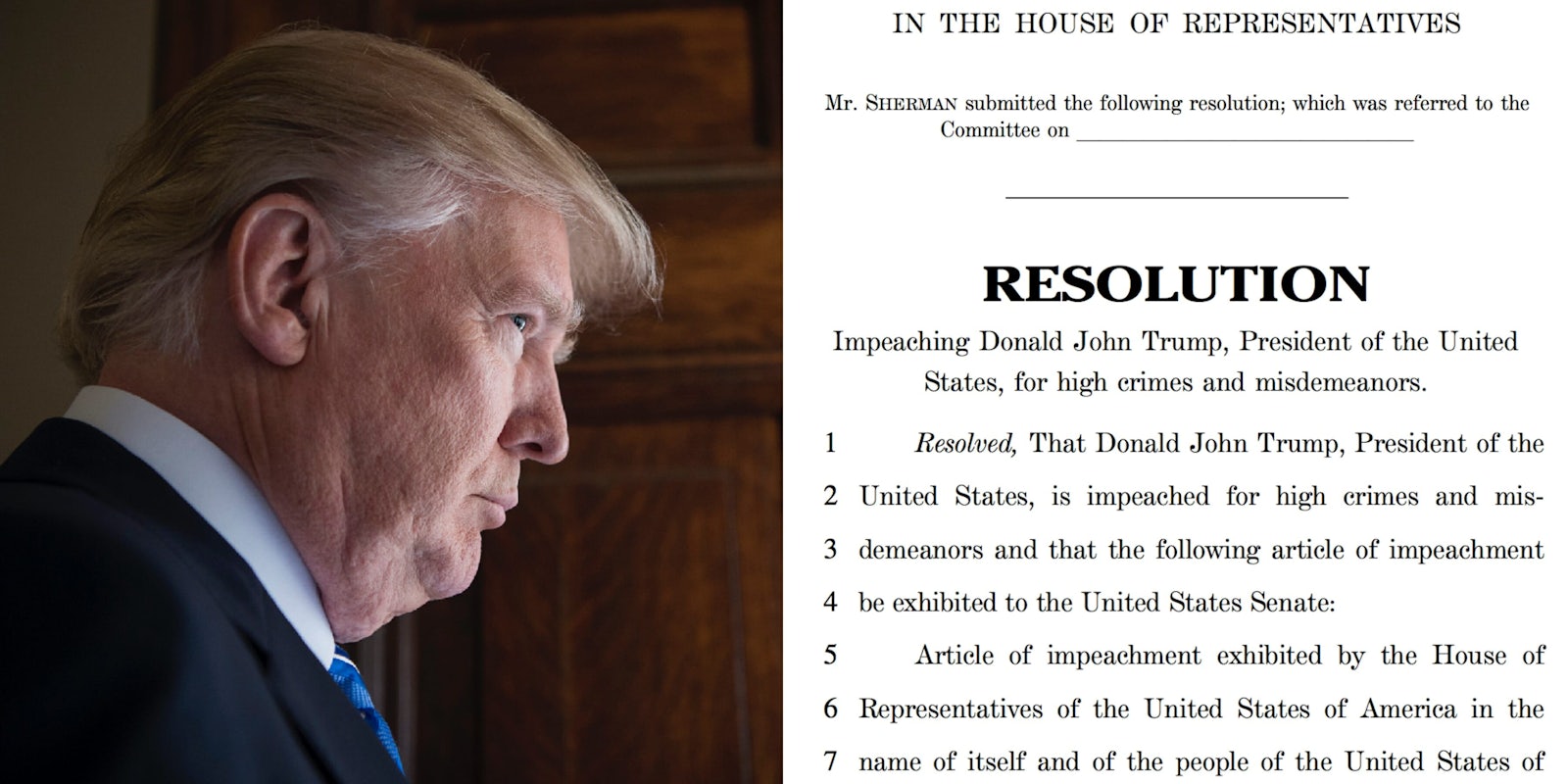The impeachment process of President Donald Trump is about to begin.
Rep. Brad Sherman, a California Democrat, announced on Monday his intention to bring articles of impeachment against Trump for his alleged obstruction of justice of the Federal Bureau of Investigation’s probe into Russia.
In a letter to members of Congress sent on Monday, Sherman asserts that Trump attempted to obstruct justice by allegedly implying former FBI Director James Comey should drop the Bureau’s investigation into former National Security Adviser Michael Flynn.
“I believe that Trump’s use of threats to obstruct the ongoing criminal investigations of Michael Flynn clearly violate 18 U.S.C. 1512(b)(3); Violations of that section are a felony,” Sherman writes in the letter. “Trump’s efforts to obstruct the investigation of his campaign’s possible collusion with Russia violated the same statute.”
Flynn resigned on Feb. 13 after the Washington Post revealed that he misled Vice President Mike Pence regarding his conversations with Russian Ambassador Sergey Kislyak. The next day, according to Comey’s June 8 testimony before the Senate Intelligence Committee, Trump met privately with Comey in the Oval Office after asking administration officials, including Pence and Attorney General Jeff Sessions, to leave the room. During the one-on-one conversation, Comey said under oath, Trump said he “hoped” Comey would “let go” the FBI’s Flynn investigation. Comey said he understood the comment from the president to be an order—one he would ultimately refuse to follow.
Trump has denied Comey’s version of events and said he would refute them under oath. If Comey’s recollections are true, the question of whether an order can be predicated upon the word “hoped.”
On May 9, Trump fired Comey. The president later cited the Russia investigation as part of his reasoning for abruptly firing the FBI director—an unexpected move. No other FBI director has been fired by a president while not under investigation for serious crimes.
Filing articles of impeachment against Trump does not mean the president will be removed from office or resign. The impeachment process involves multiple steps in both chambers of Congress, few of which are likely to result from Sherman’s actions. Republicans control both the House and Senate—a reality of which he is well aware. Instead, Sherman appears to be simply forcing the House to vote on whether to move forward with impeachment, which would put members of Congress on record.
Sherman writes in his letter:
I would hope that the Article, once submitted, would receive expeditious consideration by the Judiciary Committee. However, if it becomes clear that such consideration is not forthcoming, I (after consultation with colleagues and leadership) will make a privileged motion that the entire House of Representatives immediately debate the Article. At that point, I expect there will be a Motion to Table, thus triggering our first impeachment-related vote
As the investigations move forward, additional evidence supporting additional Articles of Impeachment may emerge. However, as to Obstruction of Justice and §1512(b)(3), the evidence we have is sufficient to move forward now. And the national interest requires that we do so.
Following Comey’s firing, Deputy Attorney General Rod Rosenstein appointed former FBI Director Robert Muller as special prosecutor to take over the federal investigation into Russia’s election interference. Comey said during his hearing that he provided Muller with his memos regarding his nine one-on-one conversations with Trump and that he believes Muller is likely investigating Trump’s potential obstruction of justice.
Newsmax CEO Chris Ruddy, a friend of the president’s, told PBS Newshour on Monday that Trump is “considering” firing Muller as special prosecutor. The White House told the Atlantic that “Chris was speaking for himself and did not speak to the president.”
Read Sherman’s draft articles of impeachment below:


